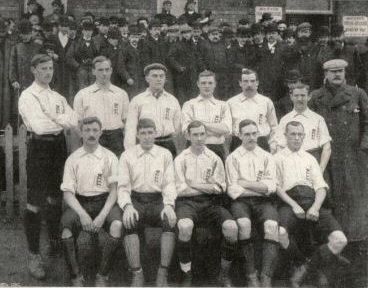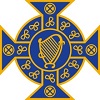|
The seventeenth match under Association rules between Ireland and England
took place at Cliftonville on Saturday in the presence of 10,000 people.
The English players, who arrived in Belfast on Friday morning, were
esteemed a fairly strong eleven, though certainly not the strongest
available. The Irish team was composed exclusively of Belfast players—four
from Cliftonville, four from Linfield, and three from Distillery. The
ground as the result of te heavy rains of the early part of the week and
the subsequent frost was in a horrible state to begin with, and a heavy
snowstorm coming on just before the start lasted through the greater part
of the game, making the playing surface still worse, and interfering
greatly with the accuracy of the play. A poor game, in which the home side
showed up far better that had been hoped or expected, ended in a win for
the Englishmen by three to two.
 Pyper started the game towards the pavilion goal, and the English left
half missing, the ball came to Oakley, who in clearing handled the ball
and got penalised. From the free the English forwards got away, Smith
being prominent thus early for some tricky work. Gibson returned finely,
and Foreman in tackling received a nasty kick from Peden, which caused
play to be stopped for a few minutes. On resuming Wheldon and his partner
got away, and Garfield headed into goal. Torrans clearing at the expense
of a corner. Scott next kicked away a tame shot from Smith, and, Gibson
sending well down the field, the ball was
passed to Mercer, who was lying well up, and who, weathering Turner,
centred well. Oakley slipped up in attempting to kick, and Pyper rushing
up had no difficulty in shooting through, registering the first score for
Ireland after fifteen minutes' play. Up to this time the English forwards
had been shaping very indifferently, slipping about sadly on the greasy
ground, and mispassing frequently. The Irish were playing the rushing
game, and playing it very well indeed, being far more at home on the miry
ground. England attacked, and for ten minutes held the homesters pinned
inside their half, shots being sent over the bar and outside the post,
while Scott got rid of one or two dangerous ones from Athersmith, who was
fed persistently, and given any number of chances. Ireland at length got
away, and Peden and his partner had a good run, the former sending the
ball tamely into Robinson's hands. The snow now ceased, and the English
play improved considerably, some nice pieces of close passing and
dribbling being displayed. Still the defence of the Irish backs was
remarkably sound and the game was thirty-five minutes old before
Athersmith gave Smith a nice pass, which enabled the English centre to
equalise the score. Still attacking and putting a little more life into
their play, the English forwards gave the Irish defence a warm time of it,
and three minutes before the interval a pretty dribble by Smith ended in
his passing out to Garfield. The latter, though, pressed, got in a lovely
centre from the corner flag right across the mouth of goal, and Athersmith,
timing the ball nicely, banged it past Scott in the net. Half-time found
the score—England, 2 goals; Ireland, 1 goal.
Pyper started the game towards the pavilion goal, and the English left
half missing, the ball came to Oakley, who in clearing handled the ball
and got penalised. From the free the English forwards got away, Smith
being prominent thus early for some tricky work. Gibson returned finely,
and Foreman in tackling received a nasty kick from Peden, which caused
play to be stopped for a few minutes. On resuming Wheldon and his partner
got away, and Garfield headed into goal. Torrans clearing at the expense
of a corner. Scott next kicked away a tame shot from Smith, and, Gibson
sending well down the field, the ball was
passed to Mercer, who was lying well up, and who, weathering Turner,
centred well. Oakley slipped up in attempting to kick, and Pyper rushing
up had no difficulty in shooting through, registering the first score for
Ireland after fifteen minutes' play. Up to this time the English forwards
had been shaping very indifferently, slipping about sadly on the greasy
ground, and mispassing frequently. The Irish were playing the rushing
game, and playing it very well indeed, being far more at home on the miry
ground. England attacked, and for ten minutes held the homesters pinned
inside their half, shots being sent over the bar and outside the post,
while Scott got rid of one or two dangerous ones from Athersmith, who was
fed persistently, and given any number of chances. Ireland at length got
away, and Peden and his partner had a good run, the former sending the
ball tamely into Robinson's hands. The snow now ceased, and the English
play improved considerably, some nice pieces of close passing and
dribbling being displayed. Still the defence of the Irish backs was
remarkably sound and the game was thirty-five minutes old before
Athersmith gave Smith a nice pass, which enabled the English centre to
equalise the score. Still attacking and putting a little more life into
their play, the English forwards gave the Irish defence a warm time of it,
and three minutes before the interval a pretty dribble by Smith ended in
his passing out to Garfield. The latter, though, pressed, got in a lovely
centre from the corner flag right across the mouth of goal, and Athersmith,
timing the ball nicely, banged it past Scott in the net. Half-time found
the score—England, 2 goals; Ireland, 1 goal.
Smith restarted, tipping the ball to the inside right, and the ball
was dribbled down on the left, where a corner was forced from Torrans.
From some smart play about the home goal, the ball came out to Morren, who
finding an opening, beat Scott for the third time five minutes after the
restart. Pyper restarted, and was mainly responsible for an incursion into
English territory, where the ball was sent behind. The snow now
recommenced, ultimately changing to a drizzling rain. The Irishmen now
pulled themselves together finely, and for ten minutes the ball was kept
in the English half, several long shots being tried with poor success by
Milne, Mercer, and M'Allen. One of J. Campbell's, however, gave Robinson
enough to do. At last Athersmith, who played finely in this half, got
away, and, beating Cochrane, forced a corner from Torrans. It was badly
placed, and Peden, getting away, kicked hard past Foreman. The English
goalkeeper ran nearly to the half-way to meet the ball, and, handling it,
was charged by three of the Irishmen while holding it. Ultimately he got
rid of it, but barely had he reached his posts again when Mercer shot in
from his right, and M'Allen, catching the pass neatly, tipped the leather
softly enough past the unfortunate Robinson into the net. A tremendous
cheer greeted this second score for Ireland. The remaining twenty minutes'
play was largely a promiscuous scramble in the mud, of which one side had
as much as the other. Scott made one or two good saves—notably one from
Smith, which he just reached by falling across the goal. Scott had more to
do than the English goalkeeper, but proved equal to the occasion, and let
no more past him. Try as they would, the Englishmen could not beat the
defence, nor could the Irish forwards beat the visiting backs. When the
time whistle sounded a hard but scientifically speaking, poor game
had resulted in a win for England by 3 goals to 2 goals.
|


.jpg)

